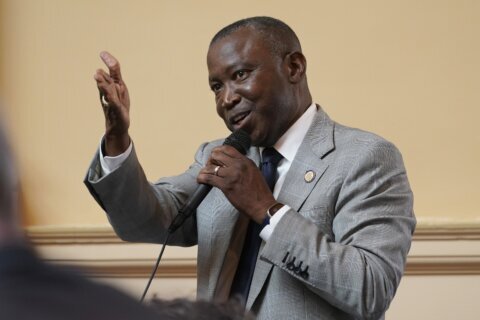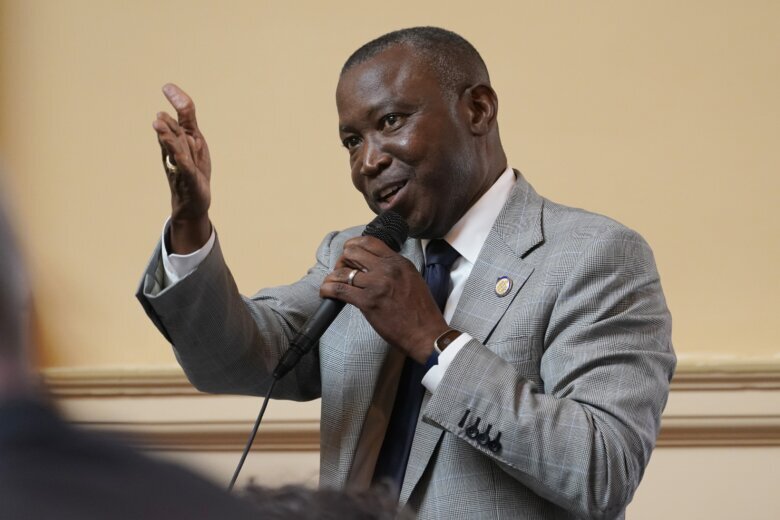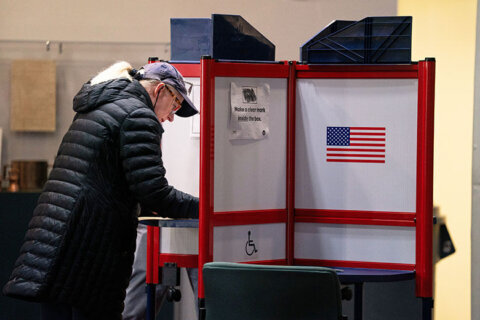This article was reprinted with permission from Virginia Mercury.

Virginia House of Delegates Speaker Don Scott, D-Portsmouth, said he’s not opposed to reconvening the General Assembly to address a public outcry over recent changes to a state program that covers higher education costs for some military families.
“There is shared ownership over this issue that we can all work together on to correct,” Scott said in an interview Tuesday evening. “Nobody has to use politics to try to take advantage of veterans.”
A U.S. Navy veteran himself, the speaker said it’s been unfortunate to see political “grandstanding” take hold in discussions of what the state should do about the Virginia Military Survivors and Dependents Education Program, which provides higher education tuition waivers and stipends to spouses and children of military members who were killed or severely disabled as a result of their service.
To address concerns the program has grown so fast over the last five years that the financial impacts are becoming too steep for public institutions to bear, state officials recently approved new limits on the program meant to narrow who’s eligible for VMSDEP benefits. The revised program imposes a stricter Virginia residency requirement, prevents the waivers from being used for advanced degrees or a second undergraduate degree and requires participants to first pursue other forms of financial aid and only use VMSDEP for remaining costs.
That winnowing of the program, enacted quietly through Virginia’s bipartisan budget deal last month, set off an uproar among military families who felt state leaders had abruptly yanked back a benefit integral to their college plans. Many of those families contend the benefit was earned through service and sacrifice, and isn’t something that should be tied to financial need or treated as a burden on universities that can’t collect tuition from VMSDEP students.
Since the new budget was approved on May 13, activists opposed to the VMSDEP rollback have bombarded Youngkin and General Assembly members with complaints and have pressed policymakers to reverse course. That’s left General Assembly members in a difficult position; they’re trying to explain the program could be susceptible to exploitation by non-Virginians or families with the means to pay for college themselves, without sounding unsympathetic to the real struggles of military veterans and their loved ones.
Ceding to the public pushback, Gov. Glenn Youngkin announced last week that he wants the General Assembly to return this month to restore the program to its former status while a state task force studies ways to get VMSDEP costs under control. Some Democrats have seemed resistant to that plan, but Scott’s comments indicate General Assembly leaders and the governor could be moving closer to a consensus on the need to reconvene by the end of the month.
“At the end of the day, we all got here together. We can all get out of here together,” Scott said. “We’re going to do it in partnership with those families. We’re going to get a solution.”
Though Republicans may have been quicker to publicly side with the upset military families, Scott said the GOP also had a hand in putting VMSDEP cost-cutting on the General Assembly’s agenda this year.
In addition to Youngkin signing the budget that included the program overhaul, Sen. Bryce Reeves, R-Spotsylvania, filed a bill this year, with support from the Youngkin administration, that included many of the same changes to the program.
“People are now playing politics with this because they bit off a little bit more than they could chew,” Scott said. “They shot first and then aimed.”
Reeves watered down his VMSDEP bill at its first Senate hearing in February, amending it to simply study the program and hold off on making changes to who would qualify. The study bill cleared the state Senate 40-0, but was blocked by the Democratic-led House Appropriations Committee in a voice vote at the end of February.
Just before that vote, a House committee staffer suggested the study bill was unnecessary because the House was pressing ahead with changes to the program through its budget proposal.
“The program has increased sixfold over the last five years, and any delay in moving forward could cause the institutions an impact of about $40 million,” legislative fiscal analyst Tony Maggio said at the Feb. 28 committee meeting.
The VMSDEP overhaul was included in the budget the General Assembly approved in March as the regular legislative session adjourned. The package of proposed budget amendments Youngkin put forward a few weeks later stripped out the VMSDEP changes and called for the type of VMSDEP study envisioned in the legislation the House blocked.
The House rejected Youngkin’s amendments in April, and the VMSDEP program changes reappeared in the final budget both sides wanted to approve quickly in May. Passing that budget ended a lengthy partisan standoff and put to rest talk of a potential government shutdown.
However, the document was largely negotiated behind closed doors, and VMSDEP supporters were frustrated to see major policy changes carried out through a few lines of text on page 641 of a 674-page budget.
The final document was released to the public just 48 hours before the May 13 vote on the budget. The VMSDEP changes included a grandfather clause exempting anyone already participating in the program or committed to a higher education institution by May 15.
Activists said that sequence of events gave families very little time to parse what was happening and left many families scrambling to try to find out how the changes would impact them.
Scott acknowledged the issue could’ve been handled differently.
“I think there’s some validity to the complaint that we probably shouldn’t have done this through the budget without legislation,” he said.
In a statement Thursday afternoon, Friends of VMSDEP, the main advocacy group pushing back against changes to the program, thanked Scott for listening to calls for a special session.
“We hope this will put us on a path to preserving VMSDEP with a vote to repeal the language in HB/SB6001 and ensure a comprehensive study is completed prior to any future proposed legislative changes,” said Friends of VMSDEP co-founder Kayla Owen. “Ultimately our goal is to make sure this program is sustainable for many years to come.”
After an unrelated event Wednesday, Youngkin told reporters he too thinks the program should remain unchanged for now and the General Assembly can revisit the issue in 2025 with “full committee hearings” that “allow Virginians and particularly our veterans to be engaged.”
“I have not had huge pushback” from the legislature, Youngkin said. “In fact, I’ve had real agreement from leadership in the House and the Senate, from Republicans and Democrats,” Youngkin said of his call for immediate action to reverse the VMSDEP changes. “I believe that we can do this. We need to come back before June 30.”
This story was updated after publication to include a statement from Friends of VMSDEP.








